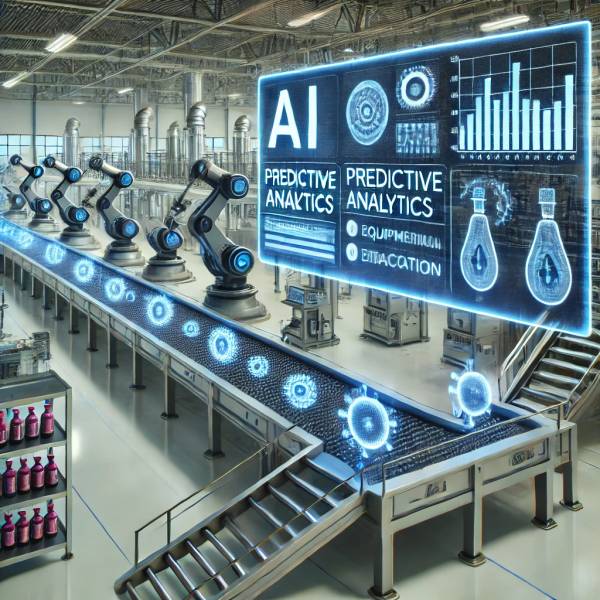hidden
Over 10 years experience of Traceability Solutions

By pharmatrax
Category: Technoloy
 No Comments
No Comments
AI and IoT in Track & Trace: Transforming Pharma Supply Chains
In today’s fast-paced pharmaceutical industry, the ability to ensure the integrity of medicines from production to patient has never been more critical. With the rise of artificial intelligence (AI) and the Internet of Things (IoT), pharmaceutical companies are rethinking their supply chain strategies, focusing on real-time monitoring, predictive analytics, and end-to-end traceability. These technologies are not just enhancing operational efficiency—they are redefining how pharmaceutical supply chains operate, ensuring greater compliance, safety, and transparency.
How IoT Devices Enable Real-Time Monitoring in Cold Chains and Serialization
Pharmaceutical products, especially vaccines and biologics, are highly sensitive to temperature fluctuations. Any deviation can compromise their efficacy, making cold chain monitoring essential. This is where IoT-enabled sensors come into play.
IoT in Cold Chain Monitoring:
- IoT sensors track environmental factors such as temperature, humidity, and light exposure in real time.
- These sensors provide instant alerts when thresholds are breached, enabling quick corrective action.
- Cloud integration ensures data is continuously transmitted, stored, and analyzed for compliance and audits.
IoT in Serialization:
IoT devices facilitate seamless serialization by automating the capture and transmission of product data at various points in the supply chain. This ensures that every unit is uniquely identified, tracked, and verified across its journey.
Example: A global vaccine distributor leveraged IoT sensors to monitor temperature during transport, ensuring that any deviation was immediately detected and addressed, preventing costly product losses.

AI for Predictive Analytics and Anomaly Detection in Supply Chains
AI’s strength lies in its ability to process vast amounts of data and identify patterns that humans might overlook. In pharmaceutical supply chains, AI-driven predictive analytics and anomaly detection play a crucial role in preventing disruptions and ensuring smooth operations.
AI in Predictive Analytics:
- AI models analyze historical data to forecast demand, enabling better inventory management and reducing waste.
- Predictive maintenance powered by AI ensures that equipment such as production lines and transportation vehicles are serviced before breakdowns occur, minimizing downtime.
AI in Anomaly Detection:
- AI algorithms can detect unusual patterns in the supply chain, such as unexpected delays or potential counterfeit activities, ensuring quick intervention.
- This capability is especially useful in identifying risks during production, packaging, and distribution, safeguarding both product quality and patient safety.
Example: A pharmaceutical manufacturer implemented AI-based predictive analytics to optimize production schedules and reduce downtime, leading to a 20% increase in efficiency.
Integration of AI and IoT with Serialization for End-to-End Visibility
When AI and IoT are integrated with serialization systems, they create a powerful framework for end-to-end visibility across the pharmaceutical supply chain.
Benefits of Integration:
- Complete Traceability: Real-time data from IoT devices combined with AI insights ensures every product is tracked and verified at each stage of the supply chain.
- Enhanced Compliance: Continuous monitoring and automated reporting streamline regulatory compliance, reducing manual efforts and errors.
- Improved Safety: With real-time alerts and predictive insights, companies can prevent potential risks, ensuring the safety and integrity of their products.
- Data-Driven Decision-Making: AI-driven analytics provide actionable insights, enabling better decision-making in areas such as logistics, inventory, and quality control.
Example: A leading pharma company integrated IoT sensors with its serialization system and used AI to analyze the data. This helped them achieve 100% product traceability, significantly improving regulatory compliance and reducing counterfeit risks.

Case Studies of Successful AI and IoT Applications in Pharma Logistics
- Cold Chain Monitoring for Vaccines:
A global logistics provider deployed IoT-enabled sensors in refrigerated trucks transporting vaccines. AI algorithms analyzed temperature data in real-time, ensuring compliance with cold chain requirements. This approach reduced spoilage by 15% and ensured timely delivery of critical medicines. - Predictive Maintenance in Manufacturing:
A pharmaceutical manufacturer used AI to predict equipment failures on its production lines. By scheduling maintenance proactively, they reduced unplanned downtime by 25%, improving overall productivity. - Counterfeit Drug Detection:
A distribution company implemented AI-powered anomaly detection to identify potential counterfeit drugs in its supply chain. Combined with IoT data, the system flagged suspicious products early, preventing them from reaching patients.
Key Takeaways
- IoT devices provide real-time monitoring in cold chains and serialization, ensuring product integrity and compliance.
- AI-driven predictive analytics and anomaly detection enhance operational efficiency and prevent supply chain disruptions.
- Integration of AI and IoT with serialization systems creates end-to-end visibility, ensuring product authenticity and safety.
- Real-world case studies demonstrate how AI and IoT can revolutionize pharmaceutical logistics, from cold chain monitoring to counterfeit detection.
 Step-by-Step Approach for Implementing AI and IoT in Pharma Track & Trace
Step-by-Step Approach for Implementing AI and IoT in Pharma Track & Trace
- Assess Supply Chain Needs: Identify areas where real-time monitoring and predictive insights can add value.
- Select IoT Devices: Choose sensors that can monitor critical parameters such as temperature, humidity, and location.
- Implement AI Solutions: Deploy AI models for predictive analytics, demand forecasting, and anomaly detection.
- Integrate with Serialization Systems: Ensure seamless integration of IoT and AI solutions with existing serialization platforms.
- Train Stakeholders: Provide training to supply chain partners and internal teams on using the new technologies effectively.
As pharmaceutical companies face growing regulatory pressures and rising counterfeit risks, adopting advanced technologies like AI and IoT is no longer a luxury—it’s a necessity. By leveraging these technologies, companies can build smarter, safer, and more transparent supply chains, ultimately enhancing patient safety and brand trust.



